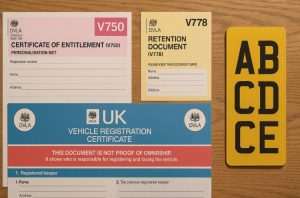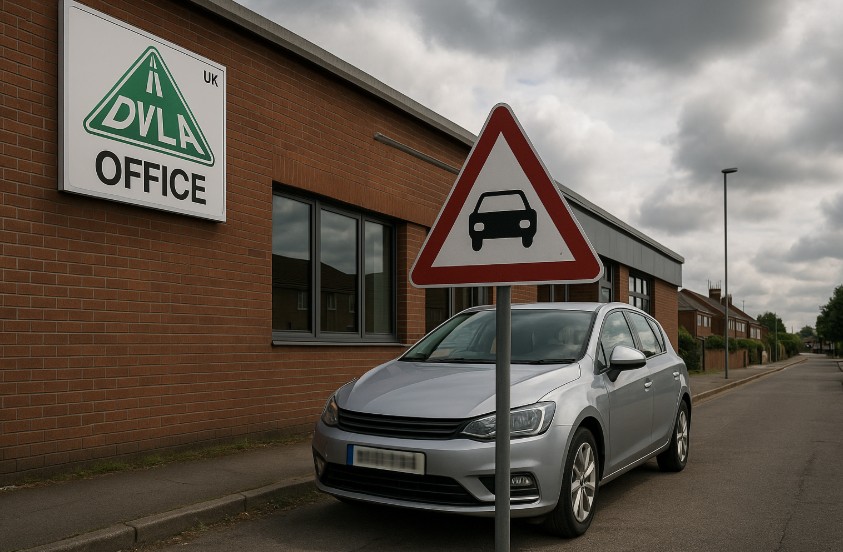The Driver and Vehicle Licensing Agency (DVLA) has issued a formal warning that could affect thousands of motorists across the UK who own personalised number plates.
The advisory relates to the expiry and renewal of certain documentation required to maintain legal ownership of private registrations.
Many vehicle owners may be unaware that a failure to renew key certificates tied to their personalised plates could lead to the loss of entitlement.
The DVLA highlighted this in a recent social media post, alerting drivers to act promptly and ensure their documentation is up to date to avoid complications on the road or at resale.
This blog aims to unpack the details of this warning, explaining the risks, requirements, and responsibilities facing those who hold private registrations.
Why Has the DVLA Issued a Warning About Personalized Number Plates?

The Driver and Vehicle Licensing Agency (DVLA) issued a public alert regarding personalised number plates that may be at risk due to expired documentation.
This warning applies primarily to motorists who acquired private number plates that have not yet been assigned to a vehicle or were previously retained but not reassigned.
The DVLA’s message was published on social media platform X, formerly known as Twitter. It reminded drivers to verify the status of their private registration certificates, particularly if they were issued 10 years ago.
The warning is significant because many vehicle owners are unaware that DVLA certificates such as the V750 or V778 have a validity period and require renewal to maintain the rights to the registration.
Thousands of drivers could face losing entitlement to their plates simply because they have failed to renew the documentation within the required timeframe. The renewal is free but time-sensitive.
This reminder targets those who:
- Purchased a private number plate but never assigned it to a vehicle
- Retained a number plate from a previously owned vehicle
- Have not checked the issue date of their V750 or V778 in over a decade
Once the entitlement lapses due to expiry, it cannot be reclaimed.
What Happens If You Don’t Renew Your Retention Certificate on Time?
Retention certificates for private registrations are only valid for 10 years from the date of issue.
After that period, if the certificate has not been renewed, the entitlement to the personalised number plate is lost permanently.
Drivers can renew their certificate for free within a 28-day window before the expiry date. There is no grace period after expiration. Once a plate returns to the DVLA’s database, it can be reassigned or released for public purchase.
A missed renewal has several possible consequences:
- The plate may become available to the general public again
- You lose the legal right to assign, sell, or transfer the number
- It cannot be used on any future vehicles
- Any resale value of the plate is lost
The DVLA advises drivers to mark their renewal dates and act early, especially since renewal methods differ based on the certificate type.
Which DVLA Forms Do Drivers Need to Check for Their Number Plate Status?

When it comes to managing and protecting a personalised number plate, understanding the correct DVLA documentation is absolutely crucial.
The type of form you need to refer to will depend on the status of your registration number—whether it’s currently assigned to a vehicle, held in retention, or never assigned at all.
There are three key documents drivers must be aware of:
1. V750 – Certificate of Entitlement
The V750 Certificate of Entitlement is issued when a person purchases a personalised number plate that has never been assigned to a vehicle. This is typically the case when someone buys a private registration as an investment, for a future vehicle, or as a gift.
Key facts about the V750:
- It shows that the holder has the legal right to assign the registration to a vehicle in the future.
- The certificate is valid for 10 years from the date of issue.
- Renewal is free of charge, but must be done within 28 days of the expiry date.
- The V750 can be renewed online through the DVLA using the reference number printed on the document.
Failure to renew the V750 before it expires will result in loss of entitlement to the registration number. It will be returned to the DVLA’s pool and can be reissued or sold to another party.
This certificate is particularly important for:
- Car dealerships storing unused plates
- Individuals buying plates as future gifts
- Collectors of high-value number plates
2. V778 – Retention Document
The V778 Retention Document is issued when a personalised plate has been previously assigned to a vehicle, but the owner chooses to remove and retain it. This allows the driver to keep the number plate for future use without assigning it to a new vehicle immediately.
Important details about the V778:
- It confirms that the registration number is being held by the owner, but is not currently in use.
- It also has a 10-year validity period, starting from the date the plate was placed on retention.
- Renewal must be completed by post, not online.
- The certificate must be submitted with the correct details and any required identification or proof of entitlement.
A common scenario for V778 usage is when someone sells a car but wants to retain their private plate to use on another vehicle later. Without renewing this document, the entitlement will lapse, and the plate cannot be re-used or sold.
3. V5C – Vehicle Registration Certificate (Logbook)
The V5C, also known as the logbook, is the document that confirms who is responsible for a particular vehicle. If your personalised number plate is currently assigned to your vehicle, the V5C will reflect that.
Points to note about the V5C:
- If the plate is active on the vehicle, there is no need for additional certificate renewals.
- The number plate remains legally assigned as long as it appears on the V5C and is not removed.
- If you plan to remove the plate or sell the vehicle but retain the plate, you must first put the plate on retention, which triggers the issue of a V778.
The V5C does not expire, but it must always be kept up to date with the correct plate number and ownership details.
When and How to Check Your Documents?
Motorists should physically check the issue date printed on their V750 or V778 certificates to determine whether they are approaching the 10-year expiry limit. Setting a calendar reminder 30 to 60 days before the renewal date is a good practice to avoid missing the window.
If you are unsure whether your plate is assigned, retained, or unassigned, consider the following:
- If you have no current vehicle displaying the plate and only a certificate, check your V750 or V778.
- If your vehicle is displaying the plate, check your V5C to ensure it’s properly registered.
- If you’ve lost your certificate, you can request a replacement through the DVLA.
Do You Need to Take Action if Your Plate Is Already Assigned to a Vehicle?
Motorists who have their personalised number plate actively assigned to a registered vehicle do not need to renew any additional documentation. The DVLA considers these registrations as live, and no action is necessary unless the plate is removed or transferred.
The V5C vehicle logbook will indicate if the personalised plate is currently in use on the vehicle. If you plan to sell the car and retain the plate, you will need to request retention through the DVLA, which will then issue a V778 certificate. That document will then require renewal every 10 years.
What Are the Legal Risks of Non-Compliant or Altered Number Plates?

Alongside the issue of document expiry, the DVLA has increased its focus on illegal modifications to number plates. A rising number of motorists are facing penalties for alterations that make the plate non-compliant or difficult to read.
According to DVLA regulations, number plates must:
- Be made of reflective material
- Display black characters on a white background (front) or yellow (rear)
- Use the correct spacing and font
- Be unobstructed by dirt or coverings
Driving with an obscured or unreadable number plate can lead to a fine of up to £1,000. It may also result in a failed MOT test.
In addition, plates that are tinted or designed to avoid camera detection, such as “ghost” plates, are considered illegal. These plates typically involve reflective films or altered characters that confuse ANPR and speed cameras.
Types of Illegal Plate Modifications and Consequences
| Modification Type | Description | Penalty |
| Tinted Plates | Dark film used to alter appearance | £100 fine |
| Ghost Plates | Altered for camera evasion | £100 – £1,000 fine |
| Mis-spaced Characters | Incorrect spacing to form names or words | £100 fine and MOT failure |
| Obstructed Plates | Dirt or objects covering digits | Up to £1,000 fine |
These modifications, even when minor, are viewed as attempts to circumvent enforcement, and may carry heavier penalties if deemed deliberate.
Why Are Ghost Plates and Stealth Plates Becoming a Bigger Problem?
Ghost plates, also known as stealth plates, are increasingly used by motorists attempting to avoid detection from law enforcement and speed cameras.
These plates are typically altered using special reflective materials, non-standard fonts, or tints that obscure their visibility.
The rise in these tactics has led to growing concern among MPs and road safety advocates. Sarah Coombes MP has called on the UK Government to increase enforcement and introduce harsher penalties for those using such plates.
She argued that some drivers have been abusing ghost plates to avoid legal consequences for dangerous or high-speed driving.
The DVLA and local police have responded by conducting more roadside checks and Automatic Number Plate Recognition (ANPR) scans to identify and penalise users of illegal plates.
Proposed solutions include:
- Increasing fines up to £1,000 for tampered plates
- Mandatory inspections for personalised plate holders
- Greater public awareness of legal requirements
How Can Motorists Safely Maintain Their Personalized Number Plates?

Drivers who invest in personalised number plates often do so at significant cost. Maintaining legal ownership and display standards is essential for preserving the value and usability of the plate.
Here are key steps drivers should follow:
- Verify the issue and expiry date on the V750 or V778
- Renew certificates within 28 days of expiry at no cost
- Store the certificate in a safe place and set reminders for renewal
- Avoid any modifications to the plate’s colour, font, or spacing
- If selling or changing vehicles, transfer the plate legally through DVLA
Motorists should also retain copies of their renewal and registration documents to prevent future disputes. In the event of a lost certificate, DVLA can provide replacements upon request.
Regular checks and compliance with DVLA rules ensure that personalised plates remain a functional, legal, and valuable asset for the vehicle owner.
Conclusion
The DVLA’s recent announcement serves as a critical reminder for drivers across the UK. Personalised number plate holders who obtained their certificates over a decade ago must act swiftly to renew their entitlement and avoid losing their cherished plates.
By keeping track of documentation and complying with the latest DVLA guidelines, motorists can retain full rights to their private registrations while staying within legal requirements.
Ignorance of these updates could result in both financial and legal trouble, making it vital to double-check paperwork now rather than later.
FAQs
What is the 10-year rule for DVLA personalised plates?
The DVLA requires that personalised number plate certificates (V750 or V778) be renewed every 10 years. Failure to do so can result in losing the plate.
How do I know if my number plate is on retention?
If your plate is not currently assigned to a vehicle, it’s likely held on a V750 or V778 certificate. Check your DVLA documents to confirm.
Can I renew a retention certificate after it has expired?
No. If the retention certificate expires without renewal, the entitlement to the plate is lost permanently and cannot be reclaimed.
Is there a fee to renew my personalised registration?
No, renewing a retention or entitlement certificate through the DVLA is free if done on time.
Are ghost plates illegal in the UK?
Yes. Ghost or stealth plates are illegal and can carry fines up to £1,000. They are designed to avoid camera detection and are a criminal offence.
What happens if I drive with an illegal number plate?
You may be fined £100–£1,000, and your vehicle could fail its MOT. Driving with an obscured or altered plate is against UK law.
How can I check the status of my personalised plate online?
You can check the status via your DVLA online account using your certificate reference number or vehicle registration details.








